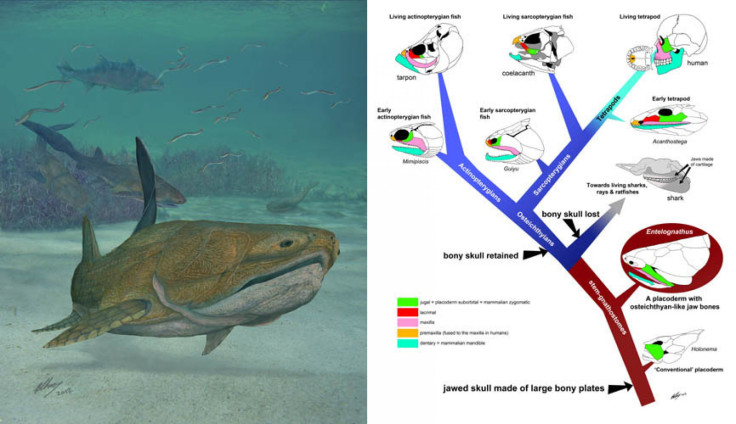Ancient Fish With A Face May Explain Evolution Of Vertebrates, Including Humans

An international team of scientists have discovered an ancient fish fossil with a type of jaw that could explain how and when vertebrates, including human beings, acquired their faces.
The researchers, led by Min Zhu of the Chinese Academy of Sciences in Beijing and lead author of the study published on Sept. 25 in Nature, found a 419-million-year-old fish from Qujing, Yunnan in China. According to the scientists, the fish is the most primitive vertebrate to have a jaw similar to that of modern vertebrates, and is one of the members of an extinct group of jawed vertebrates named “Entelognathus primordialis.”
“Entelognathus primordialis is one of the earliest, and certainly the most primitive, fossil fish that has the same jawbones as modern bony fishes and land vertebrates including ourselves,” National Geographic quoted Zhu as saying. “The human jaw is quite directly connected to the jaw of this fish, and that's what makes it so interesting.”
As the bones comprising the fish’s cheek and jaws appear similar to those found in modern bony vertebrates including humans, the fish could be the earliest known creature with a face, according to the study, which presents a three-dimensional recreation of the fish with an articulated head shield and trunk armor approximately 11 centimeters long, suggesting a total body length of more than 20 centimeters, or about 8 inches.
According to Matt Friedman, a paleobiologist at the University of Oxford, the fish fossil contains a jaw and face structure that is not similar to those in any other known members of Entelognathus's extinct family of primitive armored fishes, called the placoderms. While placoderms had simple jaws and cheeks composed of just a few large bones, the new fossil has a unique three-bone system, which is still used by chewing vertebrates today.
“Basically, as terrestrial vertebrates, we are a kind of very specialized, very bizarre fish that about 370 million years ago went on land and lost its fins. Understanding the origin of bony fishes is inextricably linked to understanding our own origins because we're bony fishes,” Friedman said.
© Copyright IBTimes 2024. All rights reserved.






















